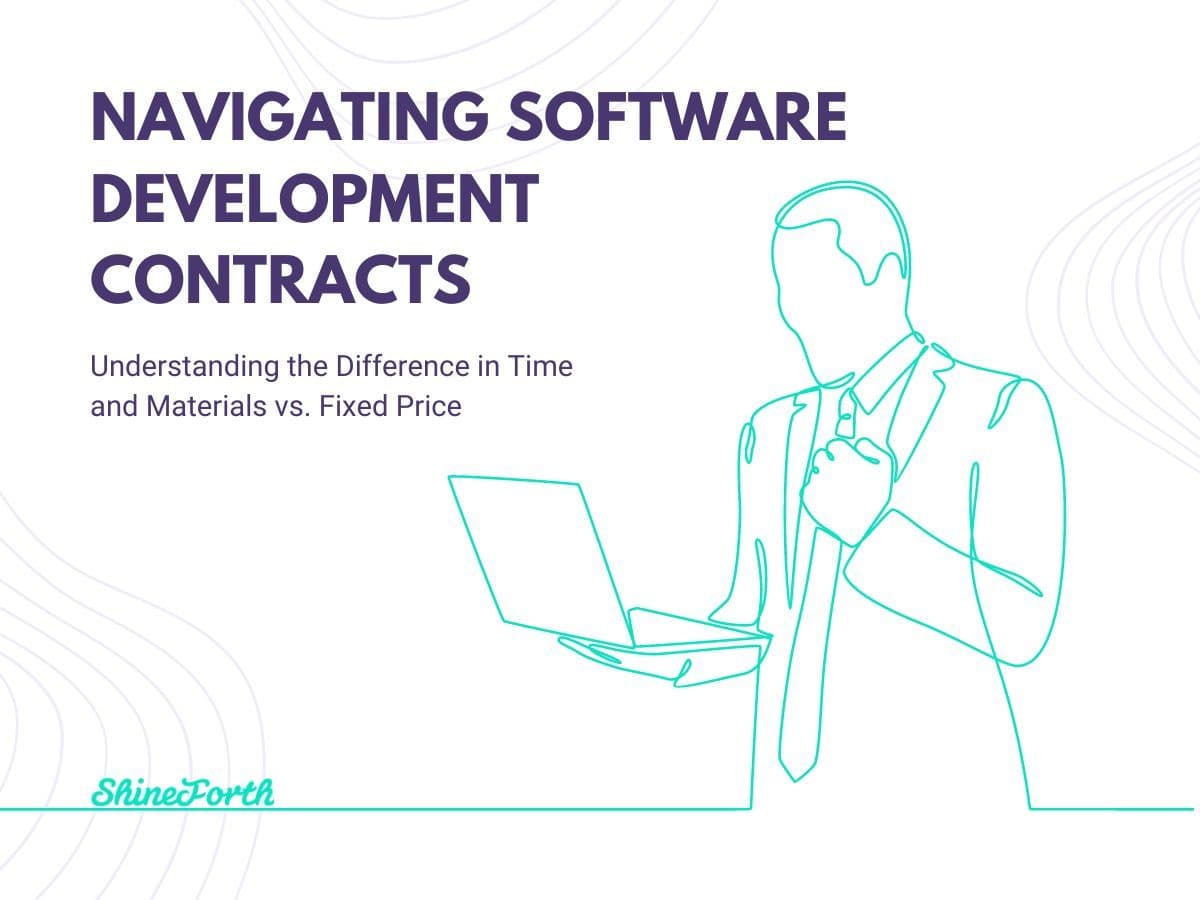Navigating Software Development Contracts: Understanding the Difference in Time and Materials vs. Fixed Price

When it comes to bringing your software dreams to life, the choice of contract can be as critical as the code itself. Two prominent contenders in the software development contract arena are Time and Materials (T&M) and Fixed Price contracts. Let's explore the benefits of both options and review how each contract type may be suitable for different projects.
Time and Materials (T&M) Contracts: A Dynamic Journey
A Time and Materials (T&M) contract is a type of software development agreement where the client and the contractor agree to pay based on the time and resources spent on the project. In essence, it's a flexible arrangement that accommodates changes, iterations, and evolving project requirements.
T&M contracts are best suited for dynamic projects where requirements are likely to change over time. Projects that involve continuous feedback loops, iterative development, and the need to adapt to evolving market conditions are prime candidates. Examples include developing mobile apps, gaming platforms, or software tools where user preferences and technological trends might prompt frequent changes.
Pros:
- Adaptable Evolution: T&M contracts shine in projects with shifting requirements. Picture an app development where user feedback sparks continuous enhancements. T&M lets you iterate and fine-tune without unnecessary constraints.
- Transparency in Action: For projects that require insight into every phase of the project, T&M delivers. The ability to witness progress in real-time will foster trust and enable prompt course correction.
- Harnessing Versatile Expertise: Envision a project that demands a range of skills at various stages. T&M allows you to access diverse expertise as required, offering a robust array of development tools at your disposal.
Cons:
- Budget Fluidity: While T&M's flexibility is valuable, it's important to manage the budget carefully to avoid unexpected cost increases that could lead to financial challenges.
- Sprint-Style Approach: While ideal for ongoing projects, T&M might not be the best fit for rigid, one-off endeavors with unchanging specs.
Fixed Price Contracts: A Surefooted March
A Fixed Price contract is a software development agreement where the client and the contractor agree on a predetermined price for the project. The scope of work, deliverables, and project timeline are all defined upfront, providing clarity and budget predictability. Fixed Price contracts allow for budget certainty, predictable timelines, and a structured approach.
Fixed Price contracts are well-suited for projects with well-defined requirements and minimal expected changes. One-time projects, such as creating a company website, developing a standalone software tool, or building a specific software module, can benefit from Fixed Price contracts. These contracts are effective when the project's scope can be clearly outlined and remains relatively stable throughout development.
Pros:
- Financial Stability: For clients seeking budget certainty, fixed price contracts offer a well-defined cost upfront, soothing nerves and ensuring stable financial planning.
- Linear Management: With scope and price etched in stone, project management takes on a predictable rhythm, allowing smooth progress tracking.
- Precise Deadlines: The fixed nature of these contracts lends itself to setting precise deadlines, aiding in meticulous project planning and resource allocation.
Cons:
- Adaptation Constraints: Fixed Price's unyielding nature can buckle under evolving requirements. Imagine a project requiring sudden strategy shifts; the rigidity might stifle innovation.
- Risk Management: When unforeseen variables come into play during a project, they can impact the budget. In such cases, contractors might need to allocate extra resources, potentially affecting the available budget for value-driven tasks.
- Limited Innovation: Fixed Price contracts may discourage innovation and flexibility within the development process. Since the scope and price are predetermined, there might be limited room for exploring creative solutions or adapting to emerging opportunities that could enhance the project.
Software development contracts aren't one-size-fits-all garments; they're tailored suits for your project's unique physique. If you foresee evolving features and iterative upgrades in response to user behavior, a Time and Materials contract is like an artist's palette, letting you layer, mix, and blend your vision. On the other hand, if your goal is developing a single-use event registration app with unchanging features, a Fixed Price contract is like a well-defined blueprint, ensuring the journey remains on track.
If you're ready to embark on your software journey and seek a partner who understands the nuances of your project, ShineForth is here to help! ShineForth is here to assist you in tailoring your project strategy to fit your unique needs, ensuring your software development journey is on the right track. Contact us today to discuss how we can help you succeed in the ever-evolving realm of software development.